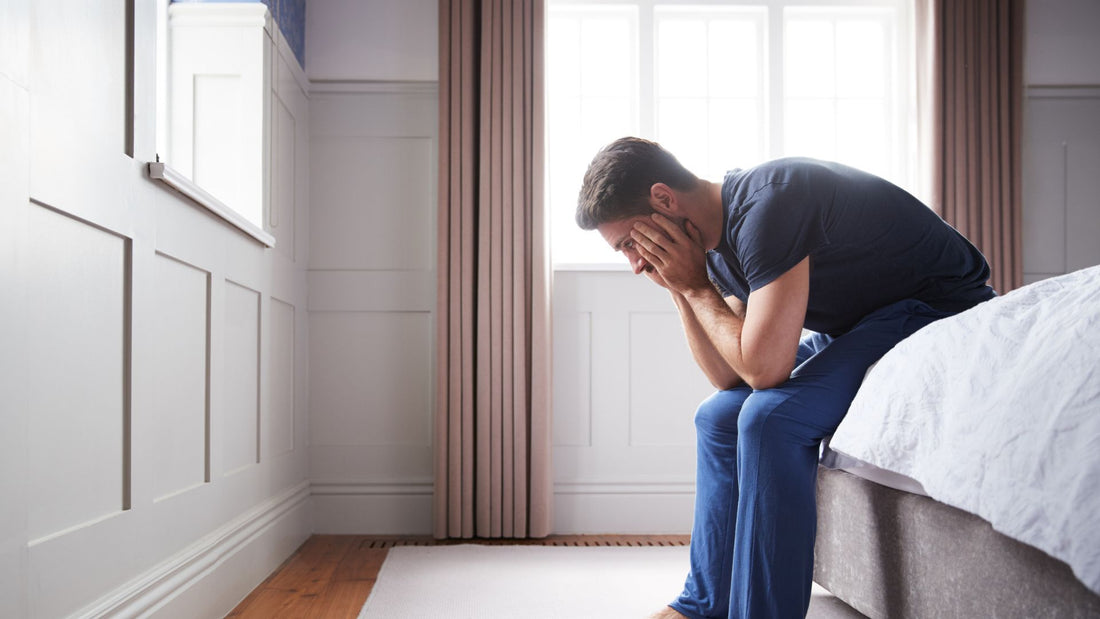As a hormone-driven adolescent or young man you might have thought your sex drive would be pretty constant and reliable throughout your life. It can be normal to lose interest in sex from time to time but sex drive, desire and satisfaction can be affected by any number of things including ageing, depression, too much alcohol, prolonged stress, being overweight, bereavement, relationship issues, illness or the side effect of some common medications. However libido is most often shaped by hormones, notably the primary male sex hormone testosterone which plays a pivotal role in regulating male libido. It is therefore no coincidence that the symptom most commonly associated with the andropause – a condition of ageing marked by a reduction in testosterone levels, also known as andropause, is low libido.
Research suggests that men with low testosterone are significantly more likely to have a low sex drive.1 Understanding how sexual desire and performance can be affected by lowered testosterone is helpful when understanding how to manage these potential changes.
Testosterone and libido
Testosterone is an essential hormone that physiologically stimulates sex drive in both women and men. However, whilst low libido is a well-documented and identified symptom of menopause in women (the result of a sharp drop in oestrogen and progesterone and a lowering of testosterone) for men of roughly the same age (late 40s, early 50s), or experiencing testosterone-deficiency during the andropause, it is less talked about and/or understood. Not least because in men levels of testosterone decline very slowly and gradually at approximately 1-2% a year after 30 2 meaning its effects may be harder to pin down. It is not known why testosterone levels fall with advancing age but we do know testosterone is responsible for libido, erectile function, sperm production, ejaculation, orgasm and fertility as well as having an important effects on mood, muscle mass and bone density – and when levels start tapering off it can potentially lead to physical and psychological changes including feeling increasingly lethargic and changes in sex drive and performance.
The impact of andropause on libido
A study in the New England Journal of Medicine identifies the most common symptoms of andropause as decreased libido, a lower incidence of morning erections and trouble getting or maintaining an erection (erectile dysfunction or ED). It also lists loss of energy, difficulty lifting heavy things, kneeling and bending as becoming more difficult and depression and fatigue more common. 3 It is important to note that ED may be due to other medical conditions (including diabetes, high blood pressure and high BMI) or medications, however, and not simply a side effect of lowered testosterone.
Managing the effects of low libido during the andropause
Whilst a changing libido is common for men in their late 40s and beyond it is also generally a manageable aspect of ageing. Here’s what can help:
Changing your lifestyle
Making a few strategic lifestyle changes can have a huge impact on your testosterone levels and sex drive including:
- Regular exercise. Men who do regular moderate exercise have been shown to have higher testosterone levels and sex drives compared to those who are more sedentary. There is also evidence to show that men who exercise regularly are less likely to develop erectile dysfunction than those who don’t and engaging in moderate to vigorous aerobic activity appears to improve ED.4 Regardless of how much exercise you do, however, being overweight, obese and having a high BMI appears to be one of the biggest risks of developing ED.
- A healthy balanced diet is important for maintaining general good health as well as optimal testosterone levels. Many nutrients including vitamin D, zinc and magnesium are important for maintaining testosterone. There is also some evidence to suggest ultra-processed or low nutrient-dense foods might contribute to lower testosterone.5. Specific foods appear to help boost testosterone production including oysters, avocados, salmon, mushrooms and vegetables such as broccoli and cauliflower.
- Taking supplements. Look for ones that contain a good range of nutrients including zinc (a deficiency of which is associated with lower testosterone levels)6 but also specific botanicals such as Tribulus Terrestris or Shilajit.
- Managing stress. Whilst it is not possible to avoid stress completely if it is prolonged it can significantly impact on hormone levels, including testosterone. In fact, evidence has shown it can reduce production at its very source – from the testes.7 Research carried out on medical students before taking an exam shows how psychological stress can significantly lower testosterone levels.8 Exercise can help to manage stress, as can getting enough sleep but other tools that can help include breathing exercises, meditation, yoga or getting outdoors.
Medical treatments
Many men who are formally diagnosed with low testosterone can have their symptoms resolved with Testosterone Replacement Therapy or TRT. Put simply, TRT gives your body the testosterone it isn’t producing and studies show testosterone therapy can improve sexual health and performance.10 Like HRT for women TRT can come in a range of forms including a gel, tablets, patches, pellets (implanted under the skin) or via an injection.11 Similarly, it doesn’t come without risks, and a common side effect of TRT is low sperm count and the body’s inability to make its own testosterone (taking artificial testosterone appears to slow the body’s production of sex hormones because it thinks you are making enough).
Low testosterone is also linked to erectile dysfunction. Depending on the cause and/or severity of your erectile dysfunction there are various treatment options including oral medications like Viagra - which enhance the effects of nitric oxide, a natural chemical that increases blood flow and allows you to get an erection in response to sexual stimulation. There are also gels available over the counter without prescription such as Eroxon™ which when applied to the penis help you to get an erection within around 10 minutes. Other possible treatments include a battery-powered penis pump, a vacuum device that diverts blood into your penis to give you an erection. If none of these are effective, a penile implant, which involves a surgical procedure where a prosthetic device is positioned inside the penis, should allow you to get an erection.12
Rethinking sex
A sudden low libido can, of course, be bewildering for both you and your partner. They might worry that they are no longer attractive to you and you can’t figure out why you’re not really interested and/or maybe can’t get, or keep, an erection like you once did. Your partner can feel unwanted, angry and resentful and in response to this you may both become withdrawn or distant. You possibly avoid touching each other because this could lead to sex and this can leave one of you feeling rejected and the other worrying you are not up to the job. This is where it can be helpful then to change your mindset: instead of relying on your hormones to put you in the mood make the conscious decision to remain physically close to your partner by hugging, kissing, touching and massaging. And get over the idea that sex equates to intercourse. It doesn’t. You can have a loving together time – massaging, touching, just being physically close and together – without everything being fixated on intercourse as the only form of sexual pleasure. Doing this should help you both to feel better connected.
Communication
Discussing low libido and/or erectile dysfunction isn’t the easiest conversation to have with anyone but communicating openly and honestly with your partner, mates and/or doctor can help you to manage it. If low libido and/or erectile dysfunction is caused by stress, depression or anxiety and/or is causing stress and tension within your relationship – professional counselling could help.
References
- https://academic.oup.com/jcem/article/91/7/2509/2656285
- https://www.healthcentral.com/slideshow/what-happens-to-testosterone-as-you-age
- https://www.nejm.org/doi/full/10.1056/NEJMoa0911101
- https://www.ncbi.nlm.nih.gov/pmc/articles/PMC5960035/
- https://www.ncbi.nlm.nih.gov/pmc/articles/PMC7830687/
- https://pubmed.ncbi.nlm.nih.gov/8875519/
- https://pubmed.ncbi.nlm.nih.gov/6348068/
- https://www.ncbi.nlm.nih.gov/pmc/articles/PMC5128352/#:~:text=Recently%2C%20research%20evidence%20suggests%20that,stress%20(such%20as%20surgery).
- https://onlinelibrary.wiley.com/doi/full/10.1002/hsr2.741
- https://www.ncbi.nlm.nih.gov/pmc/articles/PMC2701485/
- https://www.urmc.rochester.edu/urology/adult-patients/andropause-hypogonadism.aspx#:~:text=This%20condition%20generally%20affects%20older,an%20inevitable%20result%20of%20aging.
- https://www.newcastle-hospitals.nhs.uk/services/urology/our-services/erectile-dysfunction-and-andrology/insertion-of-penile-prosthesis-for-erectile-dysfunction/

